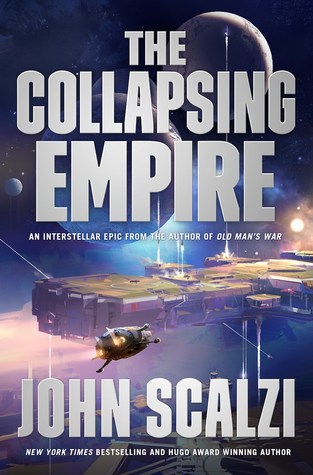 Title: The Consuming Fire
Title: The Consuming FireSeries: The Interdependency #2
Author: John Scalzi
Source/Format: Borrowed from the library; Hardcover
More Details: Science Fiction; Space Opera
Publisher/Publication Date: Tor Books; October 16, 2018
Goodreads Amazon Barnes & Noble Book Depository
Synopsis from Goodreads...
The Interdependency, humanity’s interstellar empire, is on the verge of collapse. The Flow, the extra-dimensional conduit that makes travel between the stars possible, is disappearing, leaving entire star systems stranded. When it goes, human civilization may go with it—unless desperate measures can be taken. Emperox Grayland II, the leader of the Interdependency, is ready to take those measures to help ensure the survival of billions. But nothing is ever that easy. Arrayed before her are those who believe the collapse of the Flow is a myth—or at the very least, an opportunity that can allow them to ascend to power. While Grayland prepares for disaster, others are preparing for a civil war, a war that will take place in the halls of power, the markets of business and the altars of worship as much as it will take place between spaceships and battlefields. The Emperox and her allies are smart and resourceful, but then so are her enemies. Nothing about this power struggle will be simple or easy... and all of humanity will be caught in its widening gyre....So, The Consuming Fire picked up where The Collapsing Empire left off with the collapse of the Flow being an imminent threat to even the Interdependency itself. This was one sequel that lived up to my expectations, and answered some of the questions I had about the Flow, the Interdependency, and where the story would go after the revelations at the end of The Collapsing Empire.
Where do you go when easy and far-reaching space travel is on the verge of going away? What can you do when the forces of nature are actively working against you? The situation presented an interesting conundrum, and the characters—all across the board—reacted differently; sometimes for the greater good, or for wholly self-serving reasons. There was Grayland II who wanted to do what was best for the people of the Interdependency. Yet, there were others who were in it for selfish reasons, wanting to believe the collapse is—as the synopsis states—just a myth. At the heart of the story, there was a lot of political intrigue—full of betrayals, plays for power, and so on. It was expected because the main characters were dealing with the imminent collapse of the Flow, and whatever ramification came from it. That also included the fate of the central government of the Interdependency. The Consuming Fire also touched on some interesting topics, such as the subject of denial of actual facts, and those in power trying to maintain it during a time of crisis. It’s something that was done well.
There was also more information about the Flow, which specifically delved into more about the collapse. Even if it wasn’t specific about what the Flow is, or where it came from. That being said, it still presented some interesting questions about the history that predates the Interdependency's inception.
Overall, The Consuming Fire was great. I liked the characters, and the twists were unexpected and exciting. Now, I’m very excited about what could happen in the third book in the series, The Last Emperox....









